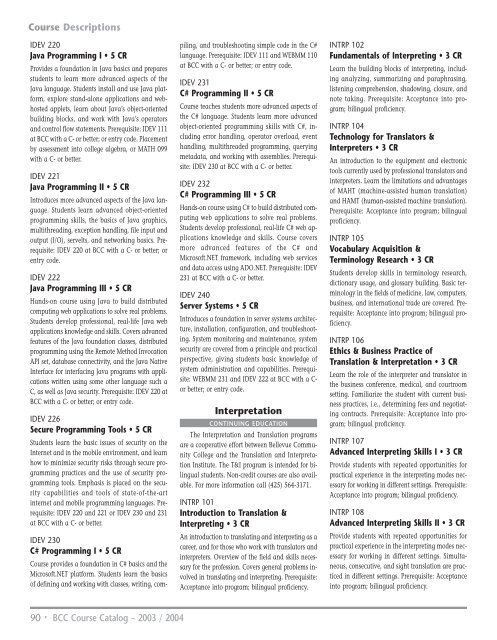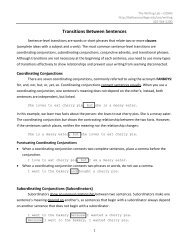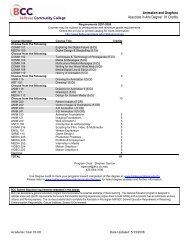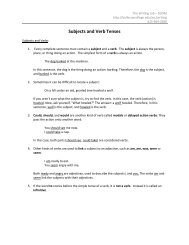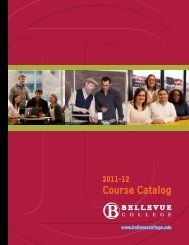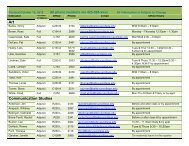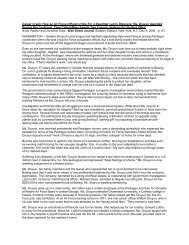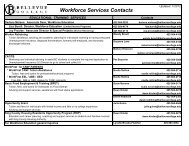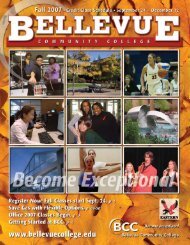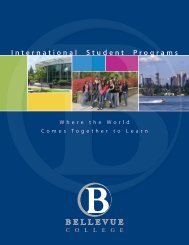2003 / 2004 - Bellevue College
2003 / 2004 - Bellevue College
2003 / 2004 - Bellevue College
Create successful ePaper yourself
Turn your PDF publications into a flip-book with our unique Google optimized e-Paper software.
Course Descriptions<br />
IDEV 220<br />
Java Programming I • 5 CR<br />
Provides a foundation in Java basics and prepares<br />
students to learn more advanced aspects of the<br />
Java language. Students install and use Java platform,<br />
explore stand-alone applications and webhosted<br />
applets, learn about Java’s object-oriented<br />
building blocks, and work with Java’s operators<br />
and control flow statements. Prerequisite: IDEV 111<br />
at BCC with a C- or better; or entry code. Placement<br />
by assessment into college algebra, or MATH 099<br />
with a C- or better.<br />
IDEV 221<br />
Java Programming II • 5 CR<br />
Introduces more advanced aspects of the Java language.<br />
Students learn advanced object-oriented<br />
programming skills, the basics of Java graphics,<br />
multithreading, exception handling, file input and<br />
output (I/O), servelts, and networking basics. Prerequisite:<br />
IDEV 220 at BCC with a C- or better; or<br />
entry code.<br />
IDEV 222<br />
Java Programming III • 5 CR<br />
Hands-on course using Java to build distributed<br />
computing web applications to solve real problems.<br />
Students develop professional, real-life Java web<br />
applications knowledge and skills. Covers advanced<br />
features of the Java foundation classes, distributed<br />
programming using the Remote Method Invocation<br />
API set, database connectivity, and the Java Native<br />
Interface for interfacing Java programs with applications<br />
written using some other language such a<br />
C, as well as Java security. Prerequisite: IDEV 220 at<br />
BCC with a C- or better; or entry code.<br />
IDEV 226<br />
Secure Programming Tools • 5 CR<br />
Students learn the basic issues of security on the<br />
Internet and in the mobile environment, and learn<br />
how to minimize security risks through secure programming<br />
practices and the use of security programming<br />
tools. Emphasis is placed on the security<br />
capabilities and tools of state-of-the-art<br />
internet and mobile programming languages. Prerequisite:<br />
IDEV 220 and 221 or IDEV 230 and 231<br />
at BCC with a C- or better.<br />
IDEV 230<br />
C# Programming I • 5 CR<br />
Course provides a foundation in C# basics and the<br />
Microsoft.NET platform. Students learn the basics<br />
of defining and working with classes, writing, com-<br />
90 • BCC Course Catalog ~ <strong>2003</strong> / <strong>2004</strong><br />
piling, and troubleshooting simple code in the C#<br />
language. Prerequisite: IDEV 111 and WEBMM 110<br />
at BCC with a C- or better; or entry code.<br />
IDEV 231<br />
C# Programming II • 5 CR<br />
Course teaches students more advanced aspects of<br />
the C# language. Students learn more advanced<br />
object-oriented programming skills with C#, including<br />
error handling, operator overload, event<br />
handling, multithreaded programming, querying<br />
metadata, and working with assemblies. Prerequisite:<br />
IDEV 230 at BCC with a C- or better.<br />
IDEV 232<br />
C# Programming III • 5 CR<br />
Hands-on course using C# to build distributed computing<br />
web applications to solve real problems.<br />
Students develop professional, real-life C# web applications<br />
knowledge and skills. Course covers<br />
more advanced features of the C# and<br />
Microsoft.NET framework, including web services<br />
and data access using ADO.NET. Prerequisite: IDEV<br />
231 at BCC with a C- or better.<br />
IDEV 240<br />
Server Systems • 5 CR<br />
Introduces a foundation in server systems architecture,<br />
installation, configuration, and troubleshooting.<br />
System monitoring and maintenance, system<br />
security are covered from a principle and practical<br />
perspective, giving students basic knowledge of<br />
system administration and capabilities. Prerequisite:<br />
WEBMM 231 and IDEV 222 at BCC with a Cor<br />
better; or entry code.<br />
Interpretation<br />
CONTINUING EDUCATION<br />
The Interpretation and Translation programs<br />
are a cooperative effort between <strong>Bellevue</strong> Community<br />
<strong>College</strong> and the Translation and Interpretation<br />
Institute. The T&I program is intended for bilingual<br />
students. Non-credit courses are also available.<br />
For more information call (425) 564-3171.<br />
INTRP 101<br />
Introduction to Translation &<br />
Interpreting • 3 CR<br />
An introduction to translating and interpreting as a<br />
career, and for those who work with translators and<br />
interpreters. Overview of the field and skills necessary<br />
for the profession. Covers general problems involved<br />
in translating and interpreting. Prerequisite:<br />
Acceptance into program; bilingual proficiency.<br />
INTRP 102<br />
Fundamentals of Interpreting • 3 CR<br />
Learn the building blocks of interpreting, including<br />
analyzing, summarizing and paraphrasing,<br />
listening comprehension, shadowing, closure, and<br />
note taking. Prerequisite: Acceptance into program;<br />
bilingual proficiency.<br />
INTRP 104<br />
Technology for Translators &<br />
Interpreters • 3 CR<br />
An introduction to the equipment and electronic<br />
tools currently used by professional translators and<br />
interpreters. Learn the limitations and advantages<br />
of MAHT (machine-assisted human translation)<br />
and HAMT (human-assisted machine translation).<br />
Prerequisite: Acceptance into program; bilingual<br />
proficiency.<br />
INTRP 105<br />
Vocabulary Acquisition &<br />
Terminology Research • 3 CR<br />
Students develop skills in terminology research,<br />
dictionary usage, and glossary building. Basic terminology<br />
in the fields of medicine, law, computers,<br />
business, and international trade are covered. Prerequisite:<br />
Acceptance into program; bilingual proficiency.<br />
INTRP 106<br />
Ethics & Business Practice of<br />
Translation & Interpretation • 3 CR<br />
Learn the role of the interpreter and translator in<br />
the business conference, medical, and courtroom<br />
setting. Familiarize the student with current business<br />
practices, i.e., determining fees and negotiating<br />
contracts. Prerequisite: Acceptance into program;<br />
bilingual proficiency.<br />
INTRP 107<br />
Advanced Interpreting Skills I • 3 CR<br />
Provide students with repeated opportunities for<br />
practical experience in the interpreting modes necessary<br />
for working in different settings. Prerequisite:<br />
Acceptance into program; bilingual proficiency.<br />
INTRP 108<br />
Advanced Interpreting Skills II • 3 CR<br />
Provide students with repeated opportunities for<br />
practical experience in the interpreting modes necessary<br />
for working in different settings. Simultaneous,<br />
consecutive, and sight translation are practiced<br />
in different settings. Prerequisite: Acceptance<br />
into program; bilingual proficiency.


